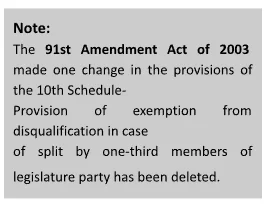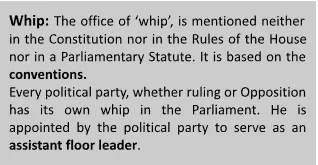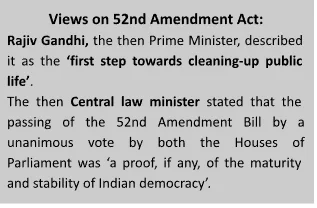The Anti-Defection Law in India, introduced through the 52nd Amendment in 1985, aims to prevent political defections and promote party discipline. It applies to Parliament and state legislatures, providing grounds for disqualification of legislators if they defect from their party or disobey party directives, with certain exceptions. This law aims to uphold the integrity of the political system and ensure stable governance.
Enroll now for UPSC Online Course
Evaluating the Anti-Defection Law in India: Challenges, Critiques, and Recommendations for Reform
Key Provisions of the Act
- The Act contains the following provisions with respect to the disqualification of legislators on the ground of defection [Articles 102(2) and 191(2)]:
- Disqualification Criteria for Legislators Under the Anti-Defection Law
| Member of the Political Party | Nominated Member | Independent Member |
|
If the nominated member joins
any political party after six months from the date on which the individual assumes their seat in the House, he stands to be disqualified. |
|
- Exceptions: The disqualification on the ground of defection does not apply in the following two cases:

- Merger: If the member goes out of his party as a result of a merger of the party with another party.
-
- A merger takes place when 2/3rd of the legislators of the party have agreed to such a merger.
- Presiding Officer: If a member, following their election as the presiding officer of the House, willingly renounces their party membership or reverts to it after stepping down from that position.
- This exception is granted to uphold the dignity and impartiality of the office.
- Deciding Authority: The Presiding Officer of the House is responsible for deciding any matter related to disqualification resulting from defection.
- Initially, the law stated that the presiding officer’s decision was final and not subject to court review.
- However, in the 1993 Kihoto Hollohan case, the Supreme Court ruled this unconstitutional, as it removed the power of judicial review from the Supreme Court and High Courts.
- Consequently, the presiding officer’s decision is now subject to judicial review.
- Rule-Making Power: The Presiding officer of a House has rule-making power to give effect to the provisions of the Tenth Schedule.

-
- Rule Approval Process: All such rules made by the presiding officer must be placed before the House for 30 days and the House may approve, modify or disapprove them.
- Handling Contraventions: Further, the presiding officer may direct that any willful contravention by any member of such rules may be dealt with in the same manner as a breach of privilege of the House.
- Initiation of Defection Cases: According to the rules, he can take up a defection case only when he receives a complaint from a member of the House.
- Opportunity for Explanation: Before concluding, the presiding officer must afford the member, against whom the complaint has been lodged, an opportunity to present their explanation.
- Referral to Committee of Privileges: Additionally, the presiding officer can refer the matter to the Committee of Privileges for further investigation.
- This implies that defection does not have an immediate and automatic effect.
- Role of Whip: He is charged with the responsibility of ensuring the attendance of his party members in large numbers and securing their support in favour of or against a particular issue.
- He is responsible for regulating and monitoring their behaviour in the Parliament.
- In case of a member defying the whip and voting against the party’s official position, they may be subject to disciplinary action under the anti-defection law.
Evaluation of the Act
- Purpose of the Anti-Defection Law: The Anti-Defection Law is crafted to curb the negative impact or harm of political defections driven by the temptation of holding office, gaining material benefits, or other comparable considerations.
- Strengthening Parliamentary Democracy: The act is intended to strengthen parliamentary democracy by curbing unprincipled and unethical political defections.
Significance of the Anti-Defection Law
- Political Stability: It aims to provide for greater stability in the body politic by checking the tendency of legislators to change parties.

- Democratic Realignment: It facilitates the democratic realignment of parties in the legislature by way of merger of parties.
- Curbing Corruption: This act reduces corruption at the political level as well as non-developmental expenditure incurred on irregular elections.
- Constitutional Recognition: This act gives, for the first time, a clear-cut Constitutional recognition of the existence of political parties.
- Responsibility and Loyalty: To make members of Parliament (MPs) more responsible and loyal to the parties with whom they were aligned at the time of their election.
- Ensuring Cohesion: It promotes stability and cohesion within political parties and prevents party system fragmentation.
Issues with Anti-Defection Law
- Curbing Dissent: Political parties many times function as an authoritarian force, suppressing dissent among its members and infringing upon the tenets of representative democracy.
- This compels members to conform to the directives of the party leadership.
- It also affects the debates and discussions in the Legislature.
- Legitimise Wholesale Horse Trading: It allows wholesale defection under the guise of merger exception ( A merger takes place when 2/3rd of the legislators of the party have agreed to such a merger) but, banned retail defection.
- Anti-party Activities Outside the Legislature: This act does not provide for the expulsion of a legislator from his party for activities outside the legislature.
- In Ravi Naik Case(1994), even the apex court said that the legislator’s conduct from outside the house, like when he is no longer interested in the betterment of the party, he is working against the interest of the party, if not formally, he has taken himself informally outside the party, such a conduct of the legislator can be inferred as an act of voluntary resignation, even though he hasn’t submitted any formal resignation.
- Discrimination Between an Independent and a Nominated Member: If an independent member joins a party, he is disqualified, while a nominated member is allowed to do the same.
- Controversial role of Speaker: The decision-making authority of the presiding officer is criticized on the following grounds.
- He may not exercise this authority impartially and objectively due to political exigencies.
- He lacks the legal knowledge and experience to adjudicate the cases.
- The provisions of the law are open to interpretation, and the decision of the presiding officer on questions of defection is final and cannot be challenged in court.
- No Time Frame: The current anti-defection law lacks clarity regarding the timeframe within which the House Chairperson or Speaker must act on such cases.
- Discrepancies exist, with some cases resolved within six months and others extending up to three years, with instances where decisions are reached after the term has concluded.
- Undermining Representative Democracy: After the enactment of the law, the chain of accountability has been broken by making legislators accountable primarily to the political party.
- Thus, this undermines the integrity of the political process and erodes public trust in the political system.
- Fragmentation of Parties: To avoid being disqualified, politicians may form their own political parties or join existing small parties, which leads to fragmentation of the party system.
Recommendations of the NCRWC
The National Commission for the Review of the Working of the Constitution was set up under Justice MN Venkatachalaiah in 2000 to examine the functioning of the Constitution, which gave its report in 2002. It recommended:
- Ministerial Cap Recommendation: The NCRWC recommended a cap of 10% of the total strength of the house on the number of ministers.
- Barring Defectors from Public Office: The defectors should be barred from holding public office or any remunerative political post for the remaining term.
- Preventing Instability Due to No-Confidence Motions: A case may arise in certain situations where the defeated legislators are not disqualified from the house and subsequently participate in the no-confidence motion against the government, then there may arise instability in the government, which anti-defection law tried to prevent.
- Judicial Rescue in Floor Management: NCRWC tried to prevent this by recommending that such votes should be declared invalid as such a provision is not there in the Anti-Defection Law.
- Though the courts have come to the rescue in such cases of floor management, such norms should be placed in the anti-defection law itself.
- The vote cast by a defector to topple the government has to be treated as invalid as recommended by the NCRWC
- Recommendations for Amendments to Anti-Defection Law: The various committees and commissions, including the Dinesh Goswami Committee recommended amendments to the Anti-defection Law due to its inability to curb the defections and political instability.
- Hence the 91st amendment act was enacted.
Enroll now for UPSC Online Course
| Must Read | |
| Current Affairs | Editorial Analysis |
| Upsc Notes | Upsc Blogs |
| NCERT Notes | Free Main Answer Writing |
Conclusion
The Anti-Defection Law is designed to curb unethical political defections and reinforce party loyalty, promoting political stability and reducing corruption.
- Despite its significance in maintaining party discipline, it faces criticism for suppressing dissent and creating potential biases in decision-making.
- Recommendations from various committees suggest necessary amendments to address these issues and enhance the law’s effectiveness.
Sign up for the PWOnlyIAS Online Course by Physics Wallah and start your journey to IAS success today!
| Related Articles | |
| Anti-Defection Law: Provisions, Power, and Authority | Judicial Review in India |
| No Confidence Motion | Supreme Court |

 GS Foundation
GS Foundation Optional Course
Optional Course Combo Courses
Combo Courses Degree Program
Degree Program









